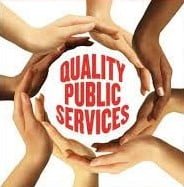Public administration plays an essential and critical role in improving people’s lives.
Reinventing public administration is a positive and necessary way forward.
Without public administration modernization and transformation to adapt to today’s needs, realizing a better future for all will be impossible.
Where capable administrations are lacking, governments are incapacitated; and where governments are incapacitated, sustainable development falls short.
In April 1996, the United Nations General Assembly, at its resumed 50th Session, adopted resolution 50/225 on Public Administration and Development.
The resolution confirmed the importance of reinforcing public administration for development and emphasized the need for cooperation among United Nations departments and agencies in supporting capacity-building in the broad areas of governance, public administration and finance.
Enhancing performance; raising morale; improving professionalism; enforcing the highest possible ethical standards; instilling a sense of core values and principles these are overarching goals we all share. They form our common agenda for change and renewal in this new global era.
Public services around the world face unprecedented challenges. An emerging, increasingly vocal and proactive civil society does not hesitate to call governments to account.
In many countries, the public service profession has lost its previous appeal and its competitive edge.
A competent, efficient and loyal civil service imbued with ethical standards is a basic precondition of governance and sustainable socio-economic development.
Public service is in rapid transition and need to enhance its role, professionalism, ethical values and standards. Public service now are required to translate an abstract concept into reality; the ability to bridge a yawning gap between, on the one hand, the resources currently available to the public service and, on the other hand, the evolving tasks, priorities and expectations of government and of the public.
The contribution of the civil service to the development of a country is indeed important although in most cases, the civil service is often labelled as too bureaucratic.
Bureaucracy in the civil service has always been seen as a constraint to the efficiency of the civil service.
Bureaucracy is inevitable but it does not mean that improvements in more efficient service delivery are not possible.
There has been a lot of evidence that the civil service has become increasingly effective and efficient and therefore because of that The UN General Assembly, on 20 December 2002, designated 23 June as Public Service Day by adopting resolution 57/277.
United Nations Public Service Day is observed on 23 June to honour people, around the world, engaged in public services a mark of respect and gratitude to people in public service, sometimes endangering their lives, in countries across the world.
The purpose was mainly to value and spread awareness about public service in the community. The UN has also started a recognition programme – the UN Public Service Awards (UNPSA) in 2003, to reward the excellent work done by public servants.

The UNPSA was reviewed in 2016 to align with the 2030 Agenda for Sustainable Development.
The UNPSA aims to promote and reward innovation and excellence in public services by recognizing the creative achievements and contributions of public institutions that lead to a more effective and responsive public administration in countries worldwide in support of sustainable development.






